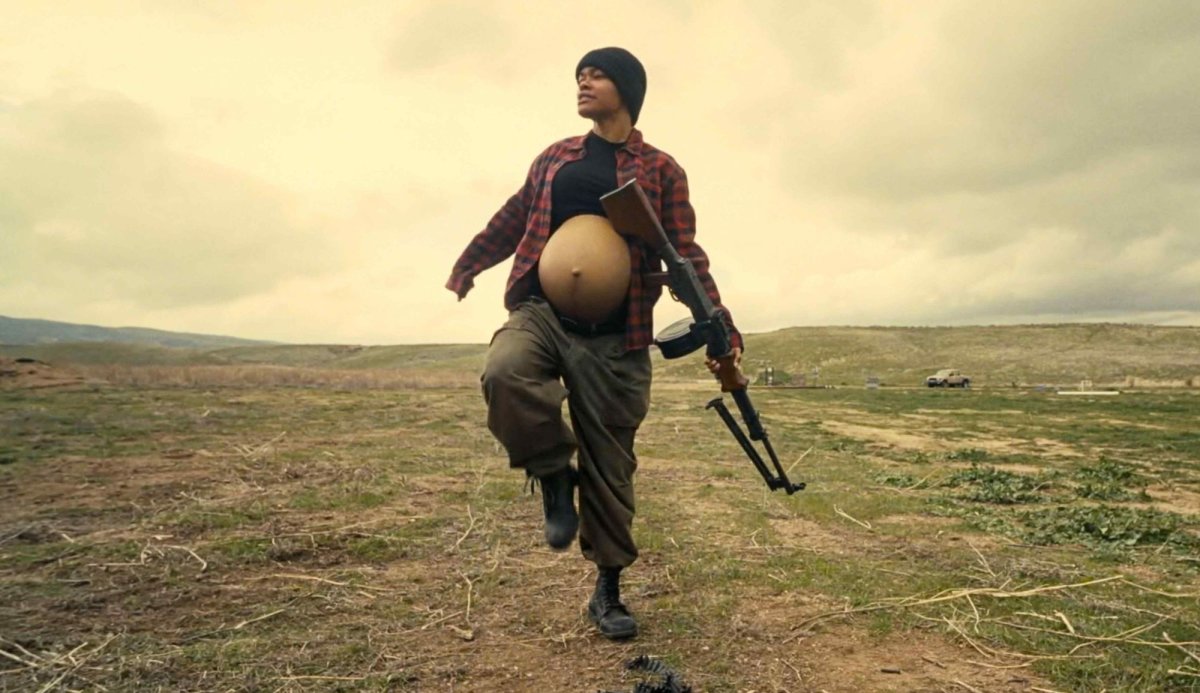
Teyana Taylor as Perfidia Beverly Hills | Image by: LANDMARK MEDIA / Alamy
4 min read
A gripping, genre-busting 162-minute epic, prepare to be entertained by Paul Thomas Anderson’s morally complex and funny film
Readers of The House magazine might think a film called One Battle After Another too much of a grim busman’s holiday. They would be sorely mistaken. Instead, this glorious genre-busting epic grips and entertains throughout its near-enough three hours. I don’t say this lightly, having rarely found movies that benefit from more than 90 minutes in length. Such is the scale, substance, subtlety and style of the writing, direction, performances, cinematography and score.
Set in a US not unlike the recent past or approximate present, Paul Thomas Anderson’s latest film features two violent extremist organisations: the Black-power inspired revolutionary “French 75” and the elitist, far-right, white-supremacist “Christmas Adventurers Club” as they vie for influence. Each grouping relies on a network of secret locations, sympathisers and underground tunnels. Unsurprisingly, in an obvious critique on modern America, the elites have vast resources and whiter infrastructure.

But the heart and soul of this tale, inspired by the Thomas Pynchon novel Vineland, is a father’s love for his missing daughter. Whilst Sean Penn’s deranged Colonel Lockjaw and Benicio del Toro’s Latinx leader Sensei are magnificent performances, even for them, Leonardo Di Caprio’s Bob Ferguson (AKA “Ghetto Pat” Calhoun and “Rocketman”), may be an extraordinary career best. Who knew the matinee idol from Titanic would mature into such a very fine actor?
By the climax of the film, Bob is middle-aged, cannabis-addled, paranoid and long-retired from the armed struggle. He is, however, devoted to his daughter with the aptly named Perfidia Beverly Hills, who left them for witness protection when the now 16-year-old was a baby. When teenage Willa is kidnapped by the corrupt Lockjaw in a purported ICE-style raid on the remote nunnery where she is in hiding, Bob, the former munitions expert must step up to find her. ICE is indeed a grim backdrop to the plot with scenes of caged immigrant families at the Mexican border. Still, in the best traditions of cinema, the darkness is shown not told or lectured.
Quintessentially American landscapes are lovingly lit and captured to breathtaking effect
There are brilliantly gritty performances from the women too. Chase Infiniti is Willa (née Charlene Calhoun), Teyana Taylor is the strong but warped Perfidia and Regina Hall is Deandra, the old-time French 75er sent to the school dance to extract Willa. Other smaller roles demonstrate the indispensable presence of women of all colours as supporters, spies and soldiers in the revolutionary movement. When Bob is briefly captured, female medics secure his escape. By contrast, the Christmas Adventurers are “pale, male and stale”.
But don’t for a minute think this film is ‘woke’. It is too morally complex and funny for easy dismissal. Some of the greatest humour comes from Bob’s inability to navigate 21st century sensitivities. His row with a telephone handler who accuses him of “invading his space” is a beautiful example.

Image by: TCD/Prod.DB / Alamy
There are homages to many great films. The Battle of Algiers which Bob watches on his couch is only the most obvious. Anderson’s is part war film (complete with uniforms, helicopters, stunts and pyrotechnics), part western, part caper movie and always nail-biting psychological thriller. The three-way car chase across undulating terrain, joins the list of greats. Quintessentially American urban and rural landscapes are lovingly lit and captured to breathtaking effect without an ounce of sentimentality.
Claustrophobic indoor scenes ooze both pathos and humour. Bob at home with Willa or watching Sensei disappearing down a trapdoor with a self-rolling rug worthy of Looney Tunes.
 Then, the music. In an age of so much tech, how many times have you heard suspense suggested by a sort of bass-level booming siren? Jonny Greenwood (of Radiohead fame) uses simple repeated piano chords to signal Bob’s anxiety and fear. Greenwood’s original score is inspired but so too the perfectly chosen additional tracks like Dirty Work (Steely Dan), American Girl (Tom Petty and the Heartbreakers) and in the perfect send-up of the Christmas Adventurers with their Jingle Bells door-knocking code; an Ella Fitzgerald version of Hark! The Herald Angels Sing.
Then, the music. In an age of so much tech, how many times have you heard suspense suggested by a sort of bass-level booming siren? Jonny Greenwood (of Radiohead fame) uses simple repeated piano chords to signal Bob’s anxiety and fear. Greenwood’s original score is inspired but so too the perfectly chosen additional tracks like Dirty Work (Steely Dan), American Girl (Tom Petty and the Heartbreakers) and in the perfect send-up of the Christmas Adventurers with their Jingle Bells door-knocking code; an Ella Fitzgerald version of Hark! The Herald Angels Sing.
Of course, the perfect additional song is not lost on these maestros. So, Gil Scott-Heron’s The Revolution Will Not Be Televised has pride of place in this film:
Green Acres, Beverly Hillbillies and Hooterville Junction
Will no longer be so damned relevant
Leave your dressing gown at home.
Baroness Chakrabarti is a Labour Peer
One Battle After Another
Directed by: Paul Thomas Anderson
Venue: General cinema release

